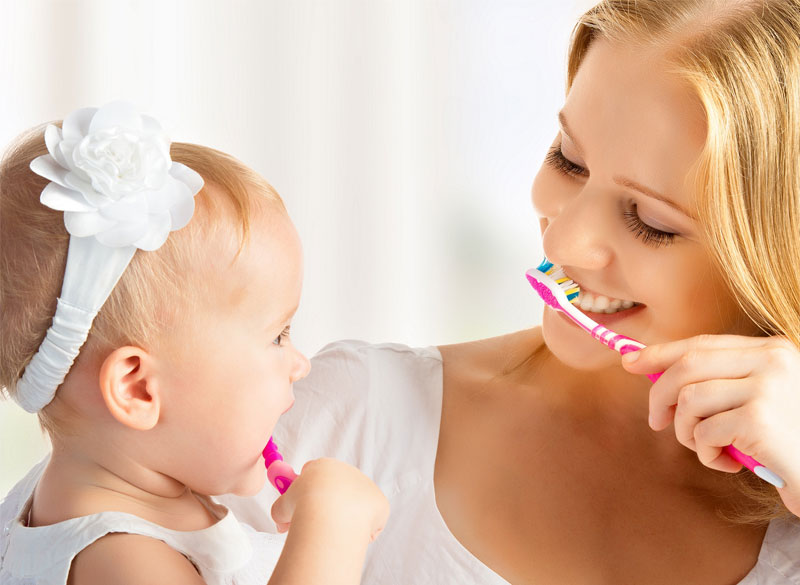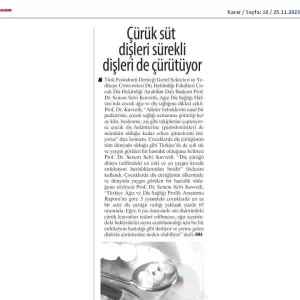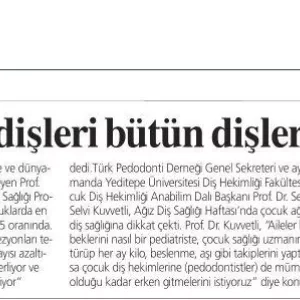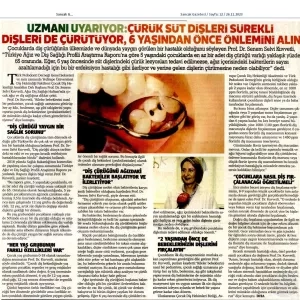Decayed primary teeth can affect permanent teeth as well; take preventive steps before age 6.

Tooth decay is quite common in children in Türkiye and around the world. According to the Türkiye's Oral and Dental Health Profile Research Report, at least one tooth decay rate in 5-year-old children is approximately 65 percent. Pedodontics expert Prof. Dr. Senem Selvi Kuvvetli warned families: "If the decay lesions in the deciduous teeth are not treated before the age of 6, this progresses like an infectious disease because the number of bacteria in the mouth cannot be reduced and may cause decay of the replacement teeth."
Prof. Dr. Senem Selvi Kuvvetli, Secretary-General of the Turkish Pedodontic Association and Head of the Department of Pediatric Dentistry at Yeditepe University Faculty of Dentistry, drew attention to children's oral and dental health at the Oral and Dental Health Week. Prof. Dr. Kuvvetli stated, "Just as families take their babies to a pediatrician, a pediatrician and follow up their weight, nutrition, and vaccination every month, we want them to go to pediatric dentists (pedodontists) as early as possible."
"Dental Caries is a Common Health Problem."
Stating that dental caries in children is a very common and widespread disease in Türkiye as in the whole world, Prof. Dr. Senem Selvi Kuvvetli said, "Dental caries is one of the oldest and most common chronic infectious diseases in the history of the world." In 2018, Türkiye's Oral and Dental Health Profile Research Report was prepared as a result of a study conducted under the control of the Ministry of Health. Providing information about the report, Prof. Dr. Kuvvetli noted the following:
"According to this report, at least one tooth decay rate in 5-year-old children is approximately 65 percent. When calculated on average, it was determined that our 5-year-old children have over 3.5 teeth in their mouths affected by caries. The age of 12 is a period when permanent teeth replace deciduous teeth. Approximately 50 percent of children in this age group were found to have at least one tooth decay and an average of 2 teeth affected by caries. These are high figures compared to the world in general. Still, tooth decay continues to be a common health problem in many countries worldwide."
"Each Age Group Has Different Characteristics."
Reminding the child's age group is defined as 0-18, Prof. Dr. Kuvvetli continued her words as follows:
"In pediatric dentistry, it is more accurate to classify age groups as children, adolescents, and young adults. Before the age of 6, we classify them as early childhood, between the ages of 6 and 12 as school age, and after age 12 as adolescence and young adulthood. Because they all have different characteristics, tooth decay can be seen in any period. Still, widespread caries, especially in early childhood, is an important health problem. As pediatric dentists (pedodontists), we think precautions should be taken regarding this issue."
"Oral Bacteria Initiates and Progresses Tooth Decay."
Noting that the bacteria that cause tooth decay are cariogenic bacteria, Prof. Dr. Senem Selvi Kuvvetli continued as follows.
"Several bacteria cause dental caries, which can ferment the sugars in the mouth, produce various acids as by-products, and disrupt the pH balance of the environment. When these bacteria are combined with dietary sugars and found together over a certain period, they cause dental caries to start. This is the general formation mechanism of tooth decay. When we look at young children, habits such as night feeding, some sucking habits that are not for nutritional purposes but can be sustained for a long time, giving breast milk on demand for a very long time after the teeth erupt, putting the child to bed with a bottle at night, adding sugar and honey to the milk in the bottle, prolong the time these bacteria coexist with sugar. Meanwhile, saliva flow decreases as metabolism slows at night, and caries become easier to form. There are bacteria in the mouth that initiate tooth decay as well as bacteria that can progress these caries. When we say that we have one cavity or two cavities, we see that a situation that spreads to all teeth has developed. Suppose dental caries are not treated before the age of 6. In that case, it progresses like an infectious disease because the number of bacteria in the mouth cannot be reduced, and it can cause decay of the new permanent teeth. Therefore, it is crucial to treat children's teeth in that age group."
"Brush your babies' teeth even before the age of 2."
Stating that the first dental examination of children should definitely be done early, Prof. Dr. Kuvvetli said:
"Just as families take their babies to a pediatrician and a child health specialist and follow up on their weight, nutrition, and vaccination every month, we want them to go to dentists as early as possible. The best time for the first dental examination is in the months following the eruption of the first milk tooth and until the baby is one year old. The International Association of Pediatric Dentists, the European Academy of Pediatric Dentistry, and the Turkish Pedodontic Association agree on one point. From the eruption of teeth until age 2, children's teeth should be brushed by mom or dad using toothpaste with at least 1000 ppm fluoride, the size of a grain of rice, as a swab on a toothbrush. This issue is somewhat overlooked. There is an opinion that teeth should be brushed when they fully erupt or after age 3, which is also wrong. From the age of 2 to 6, teeth should be brushed with 1000-1100 ppm fluoride toothpaste, this time the size of a pea. After age 6, we increase the concentration of fluoride toothpaste a little more and recommend 1450 ppm fluoride toothpaste. Today, some toothpastes do not contain fluoride. They can provide a certain level of cleanliness and oral hygiene, but to prevent dental caries, toothpaste without fluoride or toothpaste with low fluoride content is known to be insufficient to fight this chronic infectious disease."
"Children should be taught how to brush their teeth."
Pointing out that tooth brushing, which requires fine motor skills, cannot be performed as it should be in children under the age of 8-9, Prof. Dr. Kuvvetli said, "For this reason, the teeth of children under the age of 6 should be brushed by their parents or caregivers, and in the following period, the child should brush their teeth under the supervision of these people. Consulting a pediatric dentist early for the most accurate information about tooth brushing practices is also crucial. We recommend brushing the teeth twice a day, before bed at night and after a meal during the day, with fluoride toothpaste in an age-appropriate concentration and amount."
Referring to children with chronic systemic diseases and special needs, Prof. Dr. Kuvvetli said, "Children with asthma, bronchitis, mouth breathing due to allergic conditions, children born with cleft lip and palate, children who are at risk of dental caries due to some systemic diseases such as cystic fibrosis and diabetes should have acquired proper nutrition and proper care habits. That's why we urge parents to bring their children for diagnosis as early as possible to provide them with the necessary information."



